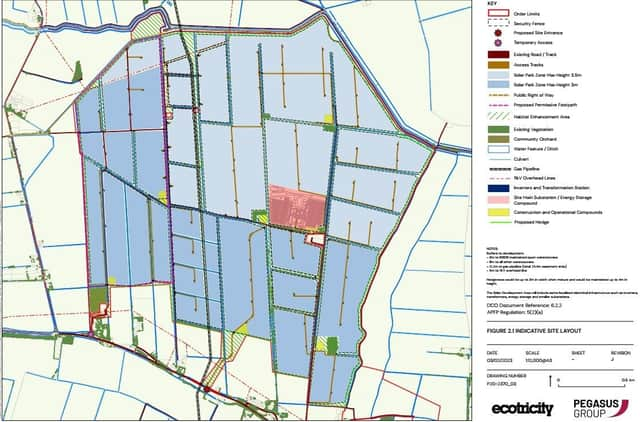County councillors object to two large solar farm projects


The authority’s Planning and Regulation Committee on Monday examined plans for the 600MW Cottam Farm and the 400MW Heckington Fen Solar Park in order to provide feedback to the Planning Inspectorate, who will ultimately decide on these large infrastructure proposals.
In both instances, councillors recommended objecting to the plans mainly due to their impact on Lincolnshire’s farmland, along with concerns around additional traffic, lack of supporting infrastructure, and a lack of development.
Advertisement
Hide AdAdvertisement
Hide AdResponding to the Cottam Farm plans near Sturton by Stow, Blyton and Corringham, Councillor Tom Smith said it was the first application he had seen which included objections on agricultural grounds.
“Additionally, it has not seen any energy-related benefits locally from the scheme because, quite simply, there aren’t any for the local area,” he said.
“This has been used as one of the sacrificial lambs on the altar of net zero, and the economic and social harm this and other NSIPs (Nationally Significant Infrastructure Proposals) will do locally cannot be understated,” he added.
He compared it to Ravenscraig in Scotland, a formerly industrial hub in Scotland which he described as a “wasteland.”
Advertisement
Hide AdAdvertisement
Hide AdEve Browning, the project development manager for Island Green Power, addressed the council’s concerns regarding the Cottam project.
She acknowledged the potential impact on agricultural land and public rights of way. Ms Browning assured the council of thorough soil assessments and land ownership security.
“By October 2024, Great Britain will no longer use coal to generate electricity. We know demand for electricity is continuing to increase, and that the UK faces some of the highest electricity costs in Europe,” she said.
“There is a clear need for renewable, affordable, and reliable energy.”
Advertisement
Hide AdAdvertisement
Hide AdOn the Heckington Fen Solar Park front, Laura White, project manager at Ecotricity, highlighted the benefits of the renewable energy project.
She stated: “There is no silver bullet when it comes to renewable energy, but we need to reduce our reliance on fossil fuels, and we need to do more to fix the climate crisis.”
Ms White further added that Ecotricity has been making and selling only renewable electricity to their customers for over 25 years.
She explained that the solar farm would allow agriculture to continue, transitioning it from arable to pastoral use, thereby producing electricity and enhancing biodiversity.
Advertisement
Hide AdAdvertisement
Hide AdThe solar farm developers said that their projects would significantly contribute to the UK’s net zero carbon emissions target and enhance local biodiversity.
The council’s role in these developments is to provide feedback to the Planning Inspectorate, and concerns were not limited to the loss of agricultural land.
Additional traffic, insufficient supporting infrastructure, and a perceived lack of development were also cited as significant issues.
Coun Paul Skinner highlighted the county’s poor infrastructure despite the surge in solar activity.
Advertisement
Hide AdAdvertisement
Hide AdHe was concerned that developers of solar farms and other NSIPs only examined the grading of the land, but not the productivity.
He pointed out towns struggling with electric car charging points due to inadequate infrastructure, questioning the benefits the local area would receive from such large-scale projects without receiving Section 106 or similar contributions.
“There are more unanswered questions in what we’ve been presented with this morning than there are answers,” he said.
Coun Marianne Overton expressed concerns about the size and impact of solar panels on agricultural land, suggesting it might industrialise and change the landscape’s character.
Advertisement
Hide AdAdvertisement
Hide AdShe, along with others, emphasised the importance of growing food and questioned the longevity of solar panels.
“We have to consider the cumulative impacts of so many applications,” she said.
“It seems the world’s gone mad. We do want renewable energy, but we’ve still got huge swathes of industrial buildings with no solar panels on the roof, and then we go and cover our agricultural fields which are still in use, growing food. It just seems bizarre.”